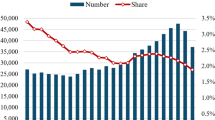Abstract
Governmental research grants are financially supported by taxpayers to meet financial requirements of research, particularly research that is unlikely to be supported by private funds. Researchers reward donors by producing knowledge. Publishing research results in an academic journal reflects achievement by researchers; however, receiving a grant award does not. The latter only provides the researcher with the capacity to perform his/her research. Applicants may receive more financial support than they actually need because there is no strict audit on the amount of money requested by each research proposal. There are fewer opportunities to apply for a governmental grant than there are for publishing an academic article, and the application process for governmental grants is not flexible. Some potentially innovative research may be impeded by the intense competition among scientific researchers applying for financial support. Researchers face stiffer competition at this stage than at the stage of publishing results. This paper suggests that scientific foundations can improve their efficiency by giving funding preference to economic proposals. Methods for estimating the efficiency of grants are proposed. The practice followed by the Small Grants for Exploratory Research programme of the National Science Foundation validates my analysis and recommendations.

Similar content being viewed by others
References
Alberts, B., Hanson, B., & Kelner, K. L. (2008). Reviewing peer review. Science, 321(5885), 15.
Anderson, M. S., Ronning, E. A., De Vries, R., & Martinson, B. C. (2007). The perverse effects of competition on scientists’ work and relationships. Science and Engineering Ethics, 13(4), 437–461.
Ascoli, G. A. (2007). Biomedical research funding: When the game gets tough, winners start to play. BioEssays, 29(9), 933–936.
Barber, B. (1961). Resistance by scientists to scientific discovery. Science, 134(3479), 596–602.
Berezin, A. A. (2001). Discouragement of innovation by overcompetitive research funding. Interdisciplinary Science Reviews, 26(2), 97–102.
Bornmann, L., Wallon, G., & Ledin, A. (2008). Does the committee peer review select the best applicants for funding? An investigation of the selection process for two European molecular biology organization programmes. PLoS One, 3(10), e3480.
Campanario, J. M. (2009). Rejecting and resisting Nobel class discoveries: accounts by Nobel Laureates. Scientometrics, 81(2), 549–565.
Campanario, J. M., & Acedo, E. (2007). Rejecting highly cited papers: The views of scientists who encounter resistance to their discoveries from other scientists. Journal of the American Society for Information Science and Technology, 58(5), 734–743.
de Solla Price, D. J. (1986). Little science, big science … and beyond. New York: Columbia University Press.
Fang, H. (2011). Peer review and over-competitive research funding fostering mainstream opinion to monopoly. Scientometrics, 87(2), 293–301.
Horrobin, D. (1996). Peer review of grant applications: A harbinger for mediocrity in clinical research? Lancet, 348(9037), 1293–1295.
Hull, D. (1988). Science as a process. Chicago: University of Chicago Press.
Kuhn, T. S. (1962). The structure of scientific revolutions. Chicago: University of Chicago Press.
Langfeldt, L., & Kyvik, S. (2011). Researchers as evaluators: Tasks, tensions and politics. Higher Education, 62(2), 199–212.
Leydesdorff, L., & Opthof, T. (2010). Scopus’s source normalized impact per paper (SNIP) versus a journal impact factor based on fractional counting of citations. Journal of the American Society for Information Science and Technology, 61(11), 2365–2369.
Marx, W., & Bornmann, L. (2010). How accurately does Thomas Kuhn’s model of paradigm change describe the transition from the static view of the universe to the big bang theory in cosmology? A historical reconstruction and citation analysis. Scientometrics, 84(2), 441–464.
Sandström, U., & Hällsten, M. (2008). Persistent nepotism in peer-review. Scientometrics, 74(2), 175–189.
Shamoo, A. E., & Resnik, D. B. (2009). Responsible conduct of research. New York: Oxford University Press.
Sidiropoulos, A., & Manolopoulos, Y. (2005). A citation-based system to assist prize awarding. SIGMOD Record, 34(4), 54–60.
Smolin, L. (2007). The trouble with physics: The rise of string theory, the fall of a science, and what comes next? Boston: Houghton Mifflin.
Spier, R. E. (2002). Peer review and innovation. Science and Engineering Ethics, 8(1), 99–108.
Spier, R. E. (2013). What is excellent science and how does it relate to what we publish in vaccine? Vaccine, 31(45), 5147–5148.
Spier, R. E., & Bird, S. J. (2003). On the Management of Funding of Research in Science and Engineering. Science and Engineering Ethics, 9(e), 298–300.
Stallings, J., Vance, E., Yang, J., Vannier, M. W., Liang, J., Pang, L., et al. (2013). Determining scientific impact using a collaboration index. PNAS, 110(24), 9680–9685.
van den Besselaar, P. (2012). Selection committee membership: Service or self-service. Journal of Informetrics, 6(4), 580–585.
Wagner, C. S., & Alexander, J. (2013). Evaluating transformative research programmes: A case study of the NSF Small Grants for Exploratory Research programme. Research Evaluation, 22(3), 187–197.
Author information
Authors and Affiliations
Corresponding author
Rights and permissions
About this article
Cite this article
Fang, H. A Discussion on Governmental Research Grants. Sci Eng Ethics 21, 1285–1296 (2015). https://doi.org/10.1007/s11948-014-9582-4
Received:
Accepted:
Published:
Issue Date:
DOI: https://doi.org/10.1007/s11948-014-9582-4




